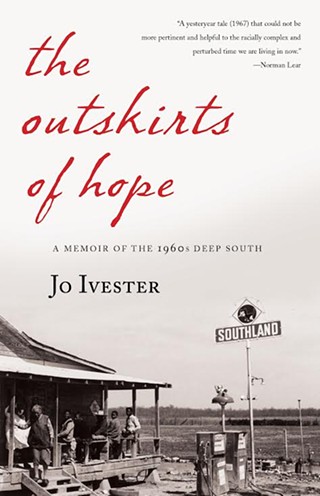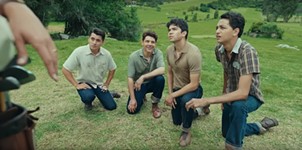The Outskirts of Hope
Jo Ivester launches civil rights-era memoir
By Jessi Cape, 3:50PM, Tue. Apr. 14, 2015
Local writer Jo Ivester’s story changed dramatically in 1967 when her parents moved the family from Massachusetts to Mississippi to open a medical clinic and teach high school literature in one of the poorest areas of the country.
The Outskirts of Hope: A Memoir of the 1960s Deep South
by Jo Ivester She Writes Press, $16.95For her new memoir – endorsed by Mayor Steve Adler and Trustee, Austin Community College District, Gigi Edwards Bryant – Ivester spent thousands of hours organizing her mother's journals from the tumultuous Civil Rights Movement days and building on the documents with her own memories and experiences. In advance of this timely, moving book's launch at BookPeople, 603 N. Lamar, Tuesday, April 14, 7pm, the Chronicle sought out Ivester via email to learn more about The Outskirts of Hope.
Austin Chronicle:I understand the basis for the book is your mother’s journals from your family’s time in small-town Mississippi in the late Sixties. What inspired you to begin the journey of expanding these into a memoir?
Jo Ivester: In 1967, when I was 10 years old, my father quit his pediatric practice in Boston to manage a new clinic in Mound Bayou, an historically all-black town in the cotton fields of Mississippi. Within weeks of our arrival, my mother, Aura Kruger, was recruited to work at the local high school, where she was the only white teacher. Although she struggled initially, often unable to even understand her students’ speech, she quickly found ways to connect, eventually becoming a beloved and sometimes controversial figure that introduced black literature into the curriculum of her English class.
Forty years later, my mother, then in her eighties and living with my family in Austin, started a journal. Every day she wrote for 20 minutes and after several years, having amassed a pile of handwritten notebooks a foot high, she felt her task was done; it was just the beginning for me. I spent over a thousand hours in the course of five years listening while she told and retold all the family anecdotes. It was my way of honoring her, of recognizing the importance of what she accomplished through her 20 years of teaching and of understanding how her experience in the classroom helped her to become the strong, independent woman I knew and loved.
At least the book started out that way. After working with my mother for several years to write her story, I realized that I also wanted to tell my own.
AC: Why is this story so relevant, so timely now in 2015?
JI: Although we have come a long way, especially in thriving, cosmopolitan cities like Austin, there is still a level of discomfort that many people have when they are with someone from a different background. Familiarity leads to comfort, and we need to consciously create opportunities for people to become more familiar with one another, whether that’s people from different religions or countries or races. And, more significantly, we need to be cautious when our lack of familiarity influences our behavior in ways we don’t even understand. For example, when interviewing people for a job, we may subconsciously seek to hire someone like ourselves. We have to become aware when this happens and aggressively move beyond it.
AC: Tell me about white privilege.
JI:Those of us who are white often take our advantages for granted. We work hard and feel as if we deserve the benefits we receive from that hard work. And we do. But it is too easy to forget that other people, for a variety of reasons, may have worked equally hard and not received the same benefits. It doesn’t mean that people are racist, just that sometimes we don’t even know when we’ve benefited from being white or male or tall or heterosexual.
AC: Did you see Ava DuVernay’s movie Selma? Thoughts?
JI:I was very moved by Selma, choked up for much of it, my eyes tearing up. It is so incredibly sad that people suffered and died because they stood up for their voting rights and those of others. It was a terrible time in our history. And it is terrible today when the unthinkable happens and people are still beaten or killed because of who they are. We must move beyond this.
Watching the movie, I was amazed at the bravery of my parents as they chose to transplant our family into the midst of the Civil Rights Movement. The film footage we saw in the movie is just what they were seeing on their television. As a child, I simply trusted that everything would be okay. As adults, they knew that things could go terribly wrong.
AC: A few months ago, plans were announced for Harper Lee’s second novel. Thoughts?
JI:I read To Kill a Mockingbird as an 11-year-old child living in Mississippi and identified very strongly with Scout. I was Scout. And my parents – both of them – were Atticus. I can’t wait to read Harper Lee’s second novel. I know that there are some issues around it and that she didn’t want to publish, but selfishly, I’m delighted that it will become available.
AC: You’re a teacher. Could this book be used as a teaching tool - for adults or children?
JI:Absolutely. There is much in Outskirts to serve as a basis for discussion in the classroom. And not just about racism. It is the story of a woman finding her strength and independence through her work in the classroom. I would love to see education students all over the country be inspired by the scenes of my mother’s high school classes, seeing examples of how to reach students in a caring manner. It’s also my own coming-of-age story, weaving together the perspectives of mother and daughter.
A note to readers: Bold and uncensored, The Austin Chronicle has been Austin’s independent news source for over 40 years, expressing the community’s political and environmental concerns and supporting its active cultural scene. Now more than ever, we need your support to continue supplying Austin with independent, free press. If real news is important to you, please consider making a donation of $5, $10 or whatever you can afford, to help keep our journalism on stands.
April 12, 2024
March 14, 2024
Jo Ivester, Mississippi, Civil Rights Movement, The Outskirts of Hope, BookPeople









